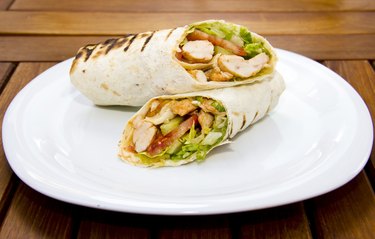
Methicillin-resistant Staphylococcus aureus, or MRSA, is an antibiotic-resistant staph infection that occurs most often in people who have been in a hospital or other health care facility. A superficial MRSA infection might cause a swollen, red area on your skin, with a pus-filled abscess that will need to be drained. Symptoms of a more serious MRSA infection include fever, chills, chest pain, shortness of breath and headache, and might require hospitalization. Left untreated, a serious MRSA infection could lead to blood poisoning, pneumonia, organ failure or death.
Step 1
Eat foods that boost your immune system. ABC Health recommends drinking kefir, a fermented yogurt that contains probiotics -- beneficial bacteria that improve your immune system by helping your body produce white blood cells. Unlike the bacteria in yogurt, which pass through your system, the bacteria in kefir colonize in your intestinal tract.
Video of the Day
Step 2
Add turmeric to your diet. Turmeric contains curcumin, which gives the spice its golden yellow color. Curcumin is an anti-inflammatory with antiseptic properties and might even be used topically with superficial cases of MRSA.
Step 3
Eat more garlic, which contains allicin, a powerful antioxidant that helps your body detoxify itself. Garlic increases the production of antibodies and stimulates the production of white blood cells that fight infection.
Step 4
Follow a balanced diet that includes a variety of fruits, vegetables, nuts and seeds. Eating foods high in vitamin C, such as citrus fruits, strawberries, kiwi and red bell peppers increases the amount of interferon in your system, the antibody that coats cell surfaces, preventing the entry of harmful bacteria. Vitamins A and E also stimulate the production of T-cells and support your immune system. Sources of vitamins E and A include nuts, seeds, vegetable oils, sweet potatoes and carrots.
Step 5
Avoid alcohol and refined sugar, both of which suppress immune system function. According to Dr. William Sears, consuming 8 tbsp. of sugar, the amount in two cans of soda, might "reduce the ability of white blood cells to kill germs by 40 percent." Drinking three or more glasses of alcohol might reduce your white blood cells' ability to multiply and damage your immune system.
Tip
Help prevent MRSA by practicing good hygiene and not sharing personal items such as razors or towels.
Warning
Too much stress and lack of sleep might also compromise your immune system. If you suspect you may have MRSA, see your doctor immediately.
Video of the Day